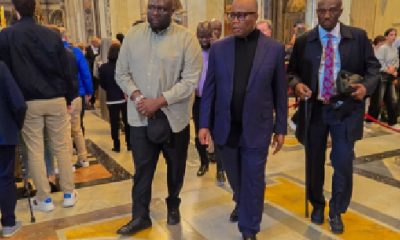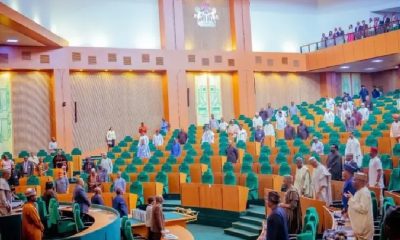Economy
FX platform: CBN sets $100,000 minimum trade for banks

The Central Bank of Nigeria has issued fresh guidelines for interbank foreign exchange trading via the Electronic Foreign Exchange Matching System, mandating a minimum trade value of $100,000.
The directive, dated 25 November 2024 and signed by Dr Omolara Duke, CBN’s Director of the Financial Markets Department, is part of efforts to ensure transparency, efficiency, and compliance within Nigeria’s FX market.
According to a new set of guidelines released by the CBN on Tuesday, the EFEMS is designed to streamline interbank FX trading, reduce counterparty risks, and ensure adherence to CBN regulations.
The apex bank has designated Bloomberg’s BMatch as the official order-matching platform for interbank transactions, with trading hours set between 9:00 am and 4:00 pm West Africa Time on business days.
One notable provision in the guidelines is the enforcement of a $100,000 minimum tradable amount, with incremental clip sizes of $50,000.
The EFEMS is also limited to spot FX transactions involving the Nigerian naira and the United States dollar.
The CBN, however, retains the discretion to introduce other currency pairs when deemed necessary.
The guidelines document read, “All trades consummated on EFEMS are binding unless canceled by mutual agreement of both parties with written approval from the CBN.
“The minimum tradable amount is US$100,000.00, with incremental clip sizes of US$50,000.00.
“Participants must set credit and settlement limits for other counterparties in the system. Transactions exceeding these limits will not be executed.
“Participants must have adequate credit and settlement limits set for the CBN as its counterparty bank.
“Participants are required to comply with the Nigerian Foreign Exchange Code and other CBN regulations.”
Participation in the EFEMS is limited to authorised dealer banks licensed by the CBN, while other institutions wishing to join the platform must first obtain prior approval.
Participants are also required to execute agreements with the CBN-approved platform provider, maintain accurate profiles, and operate within prescribed credit and settlement limits.
Withdrawal from the platform must be preceded by a 30-day notice, along with the resolution of any outstanding obligations.
Also, trades conducted via the platform will remain anonymous until matched. Counterparty details will only be revealed once transactions are concluded, in line with settlement protocols.
Transactions exceeding set limits or conducted outside EFEMS parameters must be reported promptly and logged onto the FX blotter within 10 minutes.
The CBN emphasised that it will closely monitor all transactions on EFEMS to ensure market integrity and transparency.
Participants are required to submit daily reports detailing trade volumes, settlement statuses, and counterparties.
The central bank also reserves the right to publish aggregated or disaggregated trade data for market analysis, subject to confidentiality agreements.
Any violations of the EFEMS guidelines or related regulations will attract strict penalties, including the suspension or revocation of access rights.
The CBN further stated that it will periodically review the platform’s operations to ensure efficiency and compliance with its directives.
In a separate document on Tuesday, the CBN announced that the Bloomberg BMatch system will officially go live as the EFEMS for foreign exchange trading on December 2, 2024.
The CBN outlined that all authorised dealers and banks in the interbank FX market are required to deploy the Bloomberg BMatch system for their trading activities.
The system aims to ensure uniformity and seamless trading among market participants while enabling the CBN to effectively monitor market performance and data management.
The central bank urged banks to liaise with Bloomberg representatives to expedite the onboarding process and address any technical or operational issues promptly.
Economy
More Nigerians to experience poverty by 2027 – World Bank

The World Bank’s latest Africa’s Pulse report has projects a grim future for Nigeria, with poverty expected to rise by 3.6 percentage points by 2027.
Released during the IMF and World Bank Spring Meetings in Washington, DC, the report cites Nigeria’s reliance on oil, economic fragility, and governance challenges as key drivers.
It highlights the country’s structural economic weaknesses, dependence on oil revenues, and national fragility as key barriers to meaningful poverty reduction.
“Poverty in resource-rich, fragile countries, including large economies like Nigeria and the Democratic Republic of Congo, is projected to increase by 3.6 percentage points between 2022 and 2027,” the report stated.
Despite recent growth in Nigeria’s non-oil sector during the last quarter of 2024, the World Bank warns that this progress is unlikely to translate into widespread poverty alleviation due to ongoing fiscal and institutional challenges.
The report emphasizes that Sub-Saharan Africa remains the world’s poorest region, with an overwhelming 80% of the globe’s 695 million extreme poor residing there in 2024.
Within the region, half of the 560 million extremely poor people were located in just four countries, including Nigeria.
In stark contrast, South Asia accounted for 8% of the world’s extremely poor population, East Asia and the Pacific 2%, the Middle East and North Africa 5%, and Latin America and the Caribbean 3%.
The World Bank attributes the rising poverty in Nigeria and similar economies to weakening oil prices and fragile governance structures, noting: “This follows a well-established pattern whereby resource wealth combined with fragility or conflict is associated with the highest poverty rates, averaging 46% in 2024, which is 13 percentage points higher than in non-fragile, resource-rich countries.”
Meanwhile, non-resource-rich countries in Africa are experiencing stronger economic growth and faster poverty reduction, buoyed by high agricultural commodity prices and more resilient fiscal policies.
To reverse Nigeria’s downward poverty trend, the World Bank recommends reforms that prioritize inclusive economic growth and stronger public financial management.
It calls on the government to focus on “improving fiscal management and building a stronger fiscal contract with citizens to promote inclusive economic development and long-term poverty alleviation.”
Economy
SEE current exchange rate of the Dollar to Naira

What Is the Dollar to Naira Exchange Rate at the Black Market (Aboki FX)?
Here is the Dollar to Naira exchange rate at the parallel market, popularly known as the black market (Aboki fx), for Tuesday, April 23, 2025.
You can exchange your dollars for naira at the following rates:
Black Market Exchange Rate (Lagos – April 23, 2025):
According to sources at the Bureau De Change (BDC), the exchange rate at the Lagos parallel market saw traders buying at ₦1610 and selling at ₦1620 per US dollar.
It’s important to note that the Central Bank of Nigeria (CBN) does not recognize the black market. The CBN advises individuals seeking foreign exchange transactions to do so through their banks.
Dollar to Naira Exchange Rates
Market Type Buying Rate Selling Rate
Black Market ₦1610 ₦1620
CBN Official Rate ₦1591 (Low) ₦1606 (High)
Note: Forex rates vary across dealers and regions, and actual rates may differ from those listed.
Meanwhile, the Nigeria Customs Service (NCS) has announced the seizure of 298 smuggled items worth ₦7.6 billion between January and March 2025. The NCS also disclosed that it generated a total revenue of ₦1.75 trillion in the first quarter of the year.
Economy
Volvo announces termination of 800 U.S. workers, cites tariff, market decline

Volvo Group has announced plans to lay off up to 800 workers at three of its U.S. facilities over the next three months, citing ongoing market uncertainty and declining demand exacerbated by tariffs introduced under the administration of President Donald Trump.
The affected locations include the Mack Trucks plant in Macungie, Pennsylvania, as well as Volvo Group sites in Dublin, Virginia, and Hagerstown, Maryland.
In a statement on Friday, Volvo Group North America confirmed that between 550 and 800 employees would be impacted.
The company, a subsidiary of Sweden’s AB Volvo, employs nearly 20,000 people across North America.
The layoffs come amid wider turmoil in the automotive and manufacturing sectors, as shifting U.S. trade policy and a series of tariffs continue to drive up production costs. Economists have pointed to the uncertainty surrounding Trump’s trade strategy as a factor undermining both business and consumer confidence, with concerns mounting over a potential economic slowdown or recession.
According to Volvo, the company is grappling with a decline in heavy-duty truck orders, driven by instability in freight rates, anticipated regulatory changes, and the growing financial burden of tariffs. “We regret having to take this action, but we need to align production with reduced demand for our vehicles,” a company spokesperson stated in an email quoted by Reuters.
Volvo’s announcement marks another blow to an industry already navigating a complex web of supply chain challenges and fluctuating market conditions, with other manufacturers also warning of potential cost hikes and disruptions tied to global trade disputes.
-

 News5 hours ago
News5 hours agoAkpabio arrives Vatican ahead Pope’s funeral
-

 News21 hours ago
News21 hours ago2027: Pro-Fubara protesters want suspended Gov to run as Atiku’s VP(Video)
-

 News15 hours ago
News15 hours agoRivers State is yet to fully stabilise– Ibas
-

 News22 hours ago
News22 hours agoFlights resume as NiMET unions suspend strike
-

 News22 hours ago
News22 hours agoEdo poll: How APC allegedly offered witnesses N30m bribe
-

 News18 hours ago
News18 hours agoOsun PDP Reps Dismiss Defection Claims, Pledge Support for Adeleke
-

 News22 hours ago
News22 hours agoOver 26,000 Lagos students failed 2024 WASSCE despite govt paying over N1.5bn WAEC fees
-

 News3 hours ago
News3 hours agoDefections: Teejay Yusuf traces genesis of PDP palaver, key issues affecting Nigeria’s largest opposition party


















